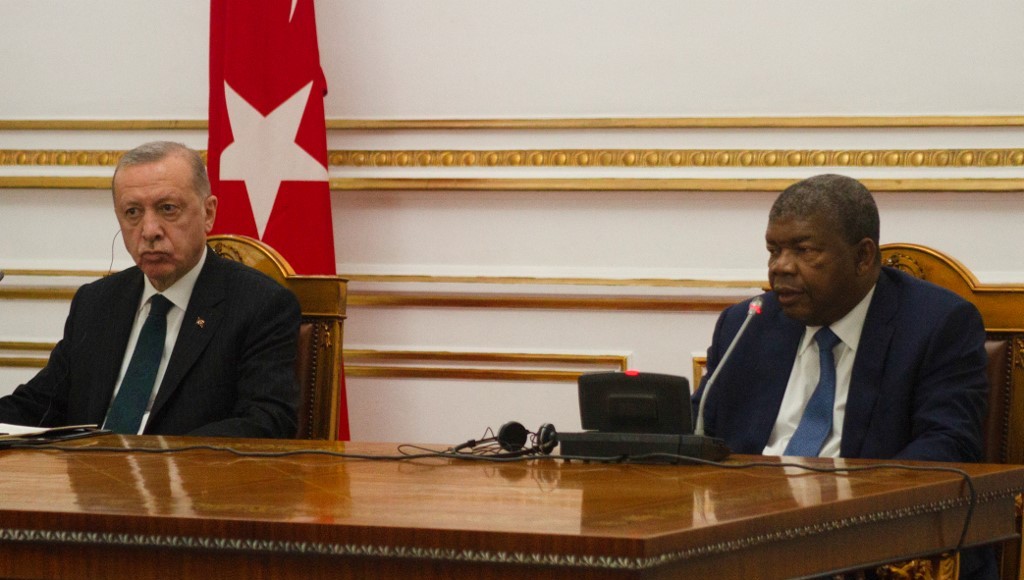Turkish President Recep Tayyip Erdoğan enters this weekend’s G20 summit in Rome fresh off an African tour aimed at cementing lucrative partnerships during another spell of tensions with the West.
From mining to health, energy to infrastructure, Turkish businesses are popping up across the resource-rich continent and signing deals hailed as a “win-win.”
This pivot away from traditional European markets has already seen Turkey’s trade with Africa balloon from $5.4 billion when Erdoğan came to power in 2003 to $25.4 billion last year.
Back from a visit to Angola, Togo and Nigeria — and in the middle of another diplomatic spat with the West — Erdoğan told an African business forum last week that Turkey wanted to see trade triple in the coming years.
One of the most strategic and controversial areas of this cooperation is defense, where Turkey has been flaunting the game-changing successes of its military drones on the battlefields of countries such as Libya.
“Defense industry products offer a new opportunity,” said associate professor Mürsel Bayram of Ankara’s Social Sciences University.
‘Afro-Eurasian’ nation
Erdoğan once described Turkey as an “Afro-Eurasian” nation and has visited the most African countries — 30 out of 54 — of any non-African head of state.
The number of Turkish embassies in Africa has grown from 12 to 43 since 2002 while the national flag carrier, Turkish Airlines, flies to over 60 African destinations.
“The main reason for our increased interest in Africa is that we saw the potential there,” Foreign Economic Relations Board chief Nail Olpak told AFP.
“Maybe we saw it a little late, but we did.”
Olpak pointed to the young, fast-growing continent’s huge need for infrastructure, from electricity to bridges, drinking water to waste disposal, where Turkish companies excel.
Turkish firms have already built a mosque in Ghana, an indoor stadium in Rwanda, an Olympic swimming pool in Senegal, and are working on an airport in Sudan.
Algeria, meanwhile, is one of Turkey’s main suppliers of liquefied petroleum gas, offering Ankara a chance to “reduce our dependence on Russia and Iran”, said Bayram.
‘Like a soaring arrow’
For African officials, Turkish companies offer jobs and reasonably priced goods the quality of which often compares favorably to those from China — one of the continent’s most aggressive investors.
“We see Turkey as a serious friend who wants to invest in Africa,” Tanzania Industry and Trade Minister Kitila Mkumbo told the Africa business forum in Istanbul, attended by more than 40 African and Turkish ministers.
“Africa is no longer interested in aid, Africa is interested in investment,” Mkumbo said in a speech which received rapturous applause.
Uganda Investment Authority board chairman Morrison Rwakakamba was among those drumming up trade, expressing hope for Turkish interest in agriculture and agro-processing in his east African country,
“With Turkey, the relationship is very much based on mutuality and win-win, and that is a very good starting point,” Rwakakamba told AFP.
The bid to expand African trade comes with the Turkish lira steadily sinking to new lows, which makes exports even more competitive.
“It is like a soaring arrow,” said Muzaffer Suat Utku, executive vice president in charge of international banking at Turkey’s Aktif Bank, which brands itself as the “bank of the African foreign trade.”
“Our exporters and investors are constantly having meetings in Africa. I believe relations will reach a much more substantial level,” Utku said.
Different from China
Some analysts believe Ankara has developed more goodwill in Africa than has Beijing, whose projects have been known to put developing countries into heavy debt.
“If we compare Turkey with China, we can see that on the ground there are different outcomes for the local people,” said Federico Donelli, international relations researcher at the University of Genoa.
“There is more involvement of local peoples and in some cases, there is also an exchange of know-how between Turkey and the local population,” Donelli told AFP.
Erdoğan’s assertive foreign policy has been a source of rising tension with the West, with critics accusing the Turkish leader lacking a strategy.
But in Africa, experts say Turkey is following a more considered approach.
“There is a long-term plan, it’s not a short-term plan,” Bayram said, pointing to investments in healthcare, education, training, and the role of women.
AFP

